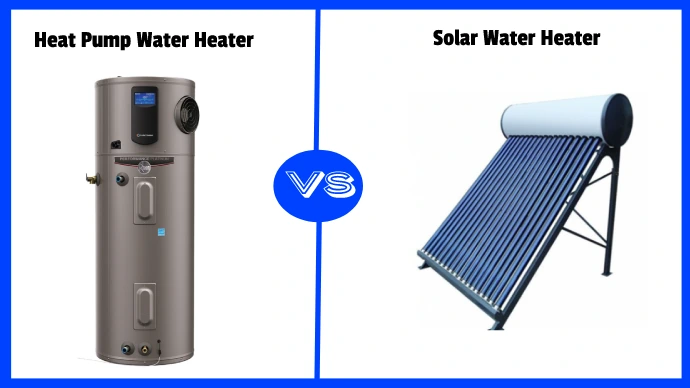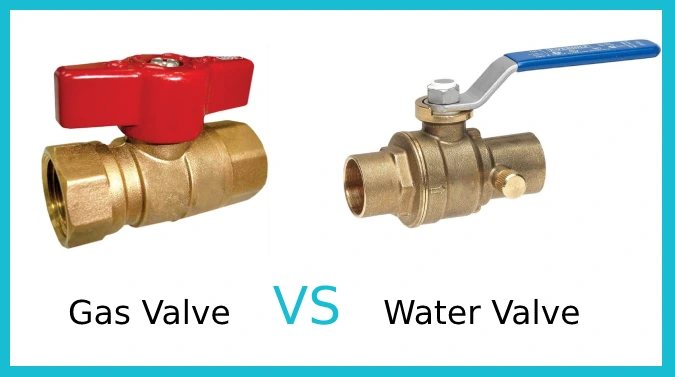Last Updated on June 12, 2023
Heat pump water heaters (HPWHs) and solar water heaters are two popular renewable energy options for heating water in residential areas. Both systems offer efficient ways to heat water, but there are considerable differences between the two.
With a heat pump water heater, you can harness the power of ambient heat sources like air, water, or geothermal energy. Solar water heaters leverage the sun’s radiant energy to heat your water. While heat pumps offer year-round operation regardless of sunlight availability, solar water heaters shine in regions with abundant sunshine.
Let’s dive into the details of heat pump water heaters versus solar water heaters and determine which fits your needs.
Heat Pump Water Heater vs Solar Water Heater: In-Depth Differences

If you’re in the market for a new water heater, you may wonder about the differences between heat pump and solar options. The following are the categories where they differ:
2. Availability and Reliability
6. Installation and Maintenance
7. Flexibility and Integration
8. Suitability for Different Climates
Let’s look into these differences and understand each system’s unique features and considerations.
1. Energy Source
Consider where you’ll be sourcing your energy from when choosing between these two options.
Heat pump water heaters use electricity to power the heat pump mechanism, which captures and transfers heat into the water.
This means that they rely on the electrical grid as their primary energy source. Since they’re highly efficient in capturing and transferring heat, using a heat pump water heater can lower electricity bills than traditional electric water heaters.
In contrast, solar water heaters get their energy from the sun’s direct and indirect radiation.
So they don’t require any electricity to run, making them extremely cost-effective once installed. Their efficiency can vary depending on factors such as weather conditions and location.
2. Availability and Reliability
Since solar water heaters rely heavily on sunlight to generate heat, they work best in sunny areas. But, their performance may be reduced in areas with limited sunlight or frequent cloud cover.
This means that while solar water heaters are a great investment for those living in sunny locations, they may need to be more reliable for those living in areas with less consistent weather patterns.
Heat pump water heaters can operate year-round without relying on direct sunlight. They are suitable for all climates and do not depend on the availability of solar radiation. But, they work best when the heat source (air, water or ground) outside is above 40°F (4°C).
Both systems have their strengths and weaknesses regarding availability and reliability depending on location and climate factors.
You should consider these variables carefully before deciding which system will work best for your situation.
3. Cost and Payback Period
Deciding between a heat pump water heater and a solar water heater ultimately comes down to cost and payback period.
Heat pump water heaters have lower upfront costs than solar water heaters, but they offer long-term savings due to their high energy efficiency. Energy savings can offset the initial investment for installing a heat pump over time.
Meanwhile, solar water heaters require a higher upfront cost due to solar collectors, storage tanks, and installation costs. But, they can pay for themselves over time through energy savings. Incentives like Small-scale Technology Certificates (STCs) can significantly reduce upfront costs in some regions.
Before deciding which system is more cost-effective in the long run, consider your budget and how long you plan on using it.
4. Hot Water Demand
If you want to have an endless supply of hot water without worrying about running out, you need to consider the level of demand in your household.
A heat pump water heater is great for households with moderate to high hot water demand. It can accommodate larger volumes of hot water and multiple occupants.
Heat pumps extract heat from the air or ground and transfer it to the water, making them highly efficient and cost-effective.
On the other hand, a solar water heater may be limited by its capacity based on its storage tank size and sunlight intensity.
While solar systems can provide hot water for households with varying demands, additional heating sources may be necessary for larger households or situations with high hot water demand.
Therefore, evaluating your household’s specific needs is crucial when deciding between a heat pump and a solar system.
5. Environmental Impact
Utilizing renewable energy sources for hot water production presents an eco-friendly alternative that can significantly reduce carbon footprint. Both heat pumps and solar water heaters are excellent options when it comes to reducing environmental impact.
Heat pumps rely on electricity to transfer ambient heat into the water, eliminating the need for the combustion of fossil fuels. This makes them a great choice for those who want to transition towards a more sustainable future without significantly changing their lifestyle. But solar water heaters win regarding environmental impact.
As they utilize solar energy, they do not require electricity or fuel input. This means that they produce zero greenhouse gas emissions during operation and have virtually no negative impacts on the environment.
Aside from that, as long as sunlight is available, they can provide hot water even during power outages or other emergencies.
Though their upfront cost may be higher than that of a heat pump, their long-term benefits make them an excellent investment in sustainability.
6. Installation and Maintenance
Installing a heat pump water heater is easy with professional installation. The plumbing won’t require big changes because the heater has few components.
You’ll need regular maintenance by cleaning the air filters, inspecting refrigerant levels, and ensuring the airflow is okay.
Conversely, solar water heaters are more difficult to install because they need complex procedures.
You’ll have to set up solar thermal collectors on the roof or in a good spot to get the most sun. You’ll also need a backup system for low sunlight periods.
Maintenance for solar heaters involves occasional cleaning of the collectors, inspecting pumps and valves, and ensuring insulation is correct.
7. Flexibility and Integration
Heat pumps can easily be added to existing water heating systems with minimal modifications. They can be used alongside traditional storage tanks or on their own.
Their compact size allows for flexible installation in various locations, like basements or utility rooms.
Conversely, solar water heaters necessitate dedicated storage tanks to hold the hot water, making them ideal for larger households.
Integrating them with your current water heating system might entail additional plumbing work and adjustments to ensure compatibility.
8. Suitability for Different Climates
Heat pump water heaters are suitable for a wide range of climates. But, they may perform poorly in extremely cold climates where the heat source temperature drops below the recommended operating range.
On the other hand, solar water heaters perform optimally in sunny and warm climates where they can be exposed to ample sunlight.
They can still function efficiently in high-humidity regions due to diffuse solar radiation but may be less efficient in areas with frequent cloud cover or limited sunlight.
To determine which system is best suited for your climate, consider the following factors:
- Temperature range: A solar water heater may be a better option if you live in an area with extreme temperatures outside the recommended operating range for heat pumps.
- Sunlight exposure: Solar water heaters require ample sunlight to operate efficiently. A heat pump water heater might be more reliable if you live in an area that gets a lot of cloud cover.
What is the life expectancy of a heat pump water heater and solar water heater?

A heat pump water heater can last around 15 years, while a well-maintained solar water heater lasts 10-20 years. But, if you’re running your system 24/7, 7 days a week without proper maintenance, its observed lifetime may shorten.
When considering longevity, remember that the initial installation process is also critical for ensuring maximum performance and efficiency throughout the lifespan of both types of systems.
Properly installed heat pumps and solar panels will have better resistance against wear and tear over time.
Regular maintenance check-ups are also essential in keeping them working optimally while extending their lives.
Can you use a solar water heater with a heat pump?
You can use a solar water heater and a heat pump together to meet the hot water needs more efficiently and efficiently.
The solar water heater can serve as the primary heat source, utilizing the sun’s energy to heat the water.
It should be noted that the heat pump can provide supplementary heat on days when there is little sunlight or when hot water is in short supply. This means that it will extract heat from the outside air or other sources, further increasing the temperature of the water.
This hybrid approach maximizes the use of renewable energy and improves the overall efficiency of the water heating system.
It also ensures a continuous hot water supply, irrespective of weather conditions or variations in solar radiation. With a heat pump and solar water heater integrated, you can meet specific needs and optimize energy consumption through a comprehensive solution.
How many solar panels does it take to run a solar water heater?
The number of solar panels needed to run a solar water heater depends on the size and efficiency of the panels, the water heater’s energy requirements, and the location. Generally, solar water heaters do not require as many panels as a typical solar electric system.
In a typical residential setting, a solar water heater can be powered by one to three solar panels. These panels are usually designed specifically for heating water and differ from those used in solar electric systems.
The exact number of solar panels needed will vary based on the size of the water heater, the desired water temperature, and the amount of sunlight available in the location.
Does a solar water heater work in winter?

Solar water heaters can work efficiently in winter, although their performance may be slightly reduced compared to summer.
The amount of sunlight available is a key factor in their effectiveness during winter, but even on cloudy or overcast days, they can capture some heat from diffused sunlight.
In colder climates, significant temperature drops may lower their heating capacity. Install solar water heaters where they’ll get plenty of sunlight all year long for optimal performance. There are extra insulation measures you can take to prevent heat loss.
Choosing the Right Water Heater: Solar vs Heat Pump
Now that you understand the major differences between heat pump water heaters and solar water heaters. While both are energy-efficient, your specific circumstances and needs will determine the best option.
If you’re interested in investing in the long-term and want to minimize maintenance costs, a solar water heater may be the right choice for you. Conversely, a heat pump water heater may be better if you’re looking for an affordable option that can function well in colder temperatures.
Picking the perfect water heater comes down to what you need. Take a sec to think about your water heating needs and weigh the options. You’ll know exactly which one suits you best in no time.



